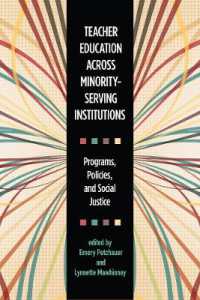Full Description
Showcasing creative decolonial feminist and critical social justice scholarship, located in a South African context, this book works across modalities and disciplines, and within art and activism, to challenge hegemonic and oppressive forms of gender and sexuality. In the wake of decolonial activism in higher education and civil society since 2015 and the larger struggle for equality and justice, Shefer, Rustin, Boonzaier and their contributors draw primarily from the work of local research and pedagogical projects directed at alternative imaginaries of gender and sexual justice, with global import.
Increasingly scholars are engaging in collaborative, dialogical and creative work that foregrounds performance, art, music, crafts, literature, as well as embodied, affective and relational engagements in the making of knowledge. This book shares some of these diverse counter-hegemonic pedagogies and research approaches that bring an intersectional and decolonial feminist lens to contemporary efforts to decolonise higher education and larger civil society.
Producing lines of thought and sharing praxis that destabilises, disrupts and opens up new possibilities for justice scholarship, the book provides a space for going beyond critical reflexivity in research and practice related to gender and sexual inequalities. It seeks to make a scholarly intervention founded on rethinking its own grounds through collaborations with knowledges often deployed by those outside the authoritative, "expert" domains of academia, aligning it with feminist and decolonial aims. This book is a valuable resource for students and scholars of gender, sexuality and intersectionality, particularly those with a focus on the global South.
Contents
Foreword
1. Re-imaginings for decolonial feminist gender and sexual justice scholarship and praxis
Part I: Situated, affective and spiritual imaginaries and resistances
2. Exploring a situated imaginary towards transversal dialogical epistemologies
3. Women's accounts of happiness: centering affect and relationality in gender justice scholarship
4. The Art of Loving Black Project. Number 1
5. Navigating gender and sexuality with an ancestral calling: A conversation amongst two feminist healers
6. Empathy education in the eyes of its perpetual pupils
Part II: Scholarly praxis in and through art, activist and reflexive creativities
7. The art of archiving and transforming: a poetics
8. Stitching through obstetric violence: threading narratives for research-creation, teaching and advocacy
9. Navigating Love, Belonging and Fractured Blackness in Cape Town: The imagined character of Radical Makazi through photography and storytelling
10. A researcher composts: finding meaning in the afterlife of fieldwork
11. Uitgeskryf, die klimeid se lyf: The politics of being for womxn in restricted spaces: A reflective visual essay.
12. Counterpublic sphere and alternative African feminist digital media and activisms
Part III: (De)centering selves: Embodied, relational and reflexive methodologies
13. Researching Ourselves, Researching Others: Making Meaning of Research on Violence and Trauma
14. Rethinking Sexuality Education in South African Contexts: Decolonial feminist provocations
15. Trespassing the borders of patriarchy: A feminist walking methodology for resistance and justice
16. Wild seaswimming methodologies for decolonial feminist justice scholarship








